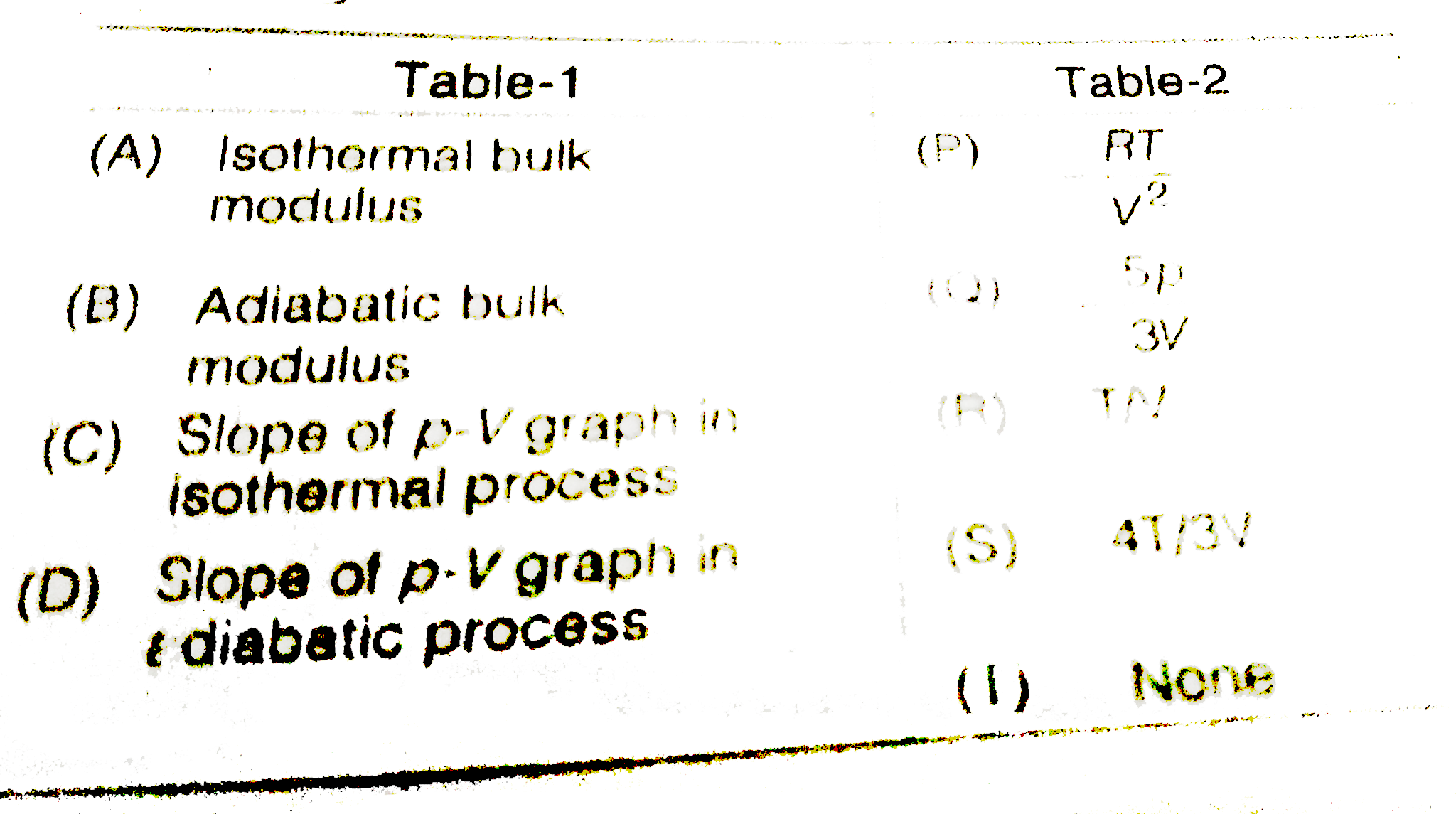One mole of a monoatomic gas is mixed with 3 moles of a diatomic gas. The molecular specific heat of the mixture at constant pressure is 138×K×R. Then find the value of K.
To solve the problem, we need to find the value of K in the expression for the molar specific heat of the mixture of gases. We have one mole of a monoatomic gas and three moles of a diatomic gas.
1. Identify the number of moles:
- Let n1=1 (moles of monoatomic gas)
- Let n2=3 (moles of diatomic gas)
2. Determine the molar specific heat capacities:
- For a monoatomic gas, the molar specific heat at constant volume Cv1=32R.
- For a diatomic gas, the molar specific heat at constant volume Cv2=52R.
3. Calculate the molar specific heat of the mixture at constant volume:
- The molar specific heat Cv of the mixture can be calculated using the formula:
Cv=n1Cv1+n2Cv2n1+n2
- Plugging in the values:
Cv=1⋅32R+3⋅52R1+3
=32R+152R4
=182R4
=94R
4. Relate the molar specific heat at constant pressure:
- The molar specific heat at constant pressure Cp is related to Cv by the equation:
Cp=Cv+R
- Therefore, we can calculate Cp:
Cp=94R+R=94R+44R=134R
5. Set up the equation with the given specific heat:
- We are given that the molar specific heat of the mixture at constant pressure is:
Cp=138KR
- Setting the two expressions for Cp equal to each other:
134R=138KR
6. Solve for K:
- Cancel R from both sides (assuming R≠0):
134=138K
- Cross-multiplying gives:
13⋅8=13⋅4K
104=52K
K=10452=2
Final Answer:
The value of K is 2.
- Let n1=1 (moles of monoatomic gas)
- Let n2=3 (moles of diatomic gas)
- For a monoatomic gas, the molar specific heat at constant volume Cv1=32R.
- For a diatomic gas, the molar specific heat at constant volume Cv2=52R.
- The molar specific heat Cv of the mixture can be calculated using the formula:
Cv=n1Cv1+n2Cv2n1+n2
- Plugging in the values:
Cv=1⋅32R+3⋅52R1+3
=32R+152R4
=182R4
=94R
- The molar specific heat at constant pressure Cp is related to Cv by the equation:
Cp=Cv+R
- Therefore, we can calculate Cp:
Cp=94R+R=94R+44R=134R
- We are given that the molar specific heat of the mixture at constant pressure is:
Cp=138KR
- Setting the two expressions for Cp equal to each other:
134R=138KR
- Cancel R from both sides (assuming R≠0):
134=138K
- Cross-multiplying gives:
13⋅8=13⋅4K
104=52K
K=10452=2
The value of K is 2.
Similar Questions
One moles of a monatomic gas is mixed with three moles of a diatomic gas. The molar specific heat of the mixture at constant volume is
View SolutionOne mole of a mono-atomic ideal gas is mixed with one mole of a diatomic ideal gas. The molar specific heat of the mixture at constant volume is ……
View Solution
Knowledge Check
Two moles of oxygen are mixed with eight moles of helium. The effective specific heat of the mixture at constant volume is
A1.3RB1.4RC1.7RD1.9R
One mole of an ideal monoatomic gas is mixed with one mole of an ideal diatomic gas. The molar specific heat of the mixture at constant volume is (in Calories )
View SolutionWhen 1 mole of monoatomic gas is mixed with 2 moles of diatomic gas, then find gamma for the mixture of gases.
View SolutionIf one mole of a monatomic gas (γ=53) is mixed with one mole of a diatomic gas (γ=75), the value of gamma for mixture is
View SolutionIf one mole of a monatomic gas (γ=53) is mixed with one mole of a diatomic gas (γ=75), the value of gamma for mixture is
View Solutionn1 mole of a monoatomic gas is mixed with n2 mole of a diatomic gas. (Assume gases are ideal). If for the mixture adiabatic contant is found to be 1.5, then n1:n2 is :
View SolutionFor one mole of a monoatomic gas match the following.

View SolutionOne mole of monoatomic gas and one mole of diatomic gas are mixed together. What is the molar specific heat at constant volume for the mixture ?
View Solution
